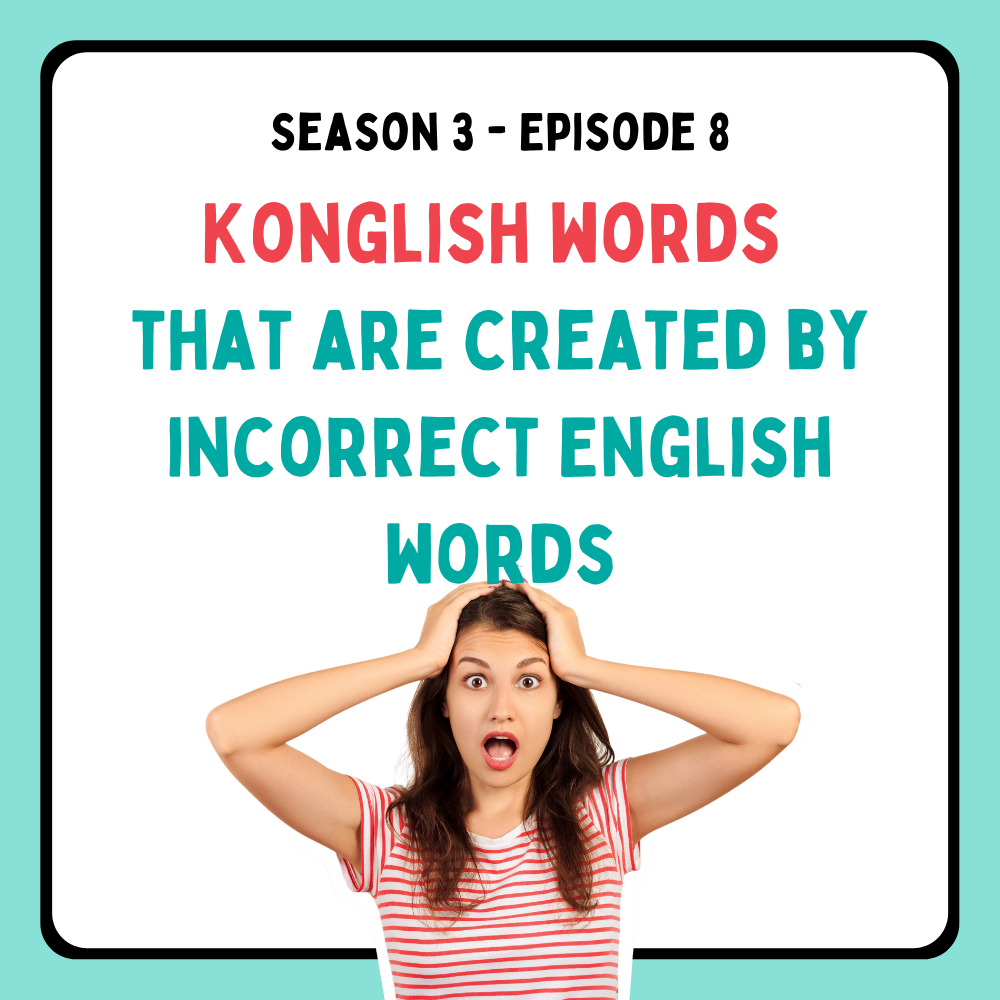Powered by RedCircle
시즌3 8화. 잘못된 영어 단어로 만든 한국어 단어들
S3 EP8. Korean words that are created by incorrect English words
안녕하세요? 잘 지냈어요? It is your host of the Korean study café, Vanessa. Have you heard of some Korean words that somewhat sound like English words, but you cannot grasp the exact meaning right away?
Yes! Many Korean words are influenced by English words that do not make sense in English. You might think that you can use the English words as it is for this case, but it is not that simple. The problem is that many Koreans who do not speak English well firmly believe that these words are English. So if you use the right English word, they would not understand you even more. So think that these are Korean words; otherwise, it does not make sense to you, making you speak Korean harder.
There are three different cases in terms of Konglish words.
The first case is the words that are minimized incorrectly. Examples are 에어컨 Air conditioner, 리모컨 Remote control, and so on.
So Korean people take out the part “ditioner” and say 에어컨 Air con(ditioner) also, they take out several random parts of the word “Remote control” and made a Konglish word 리모컨.
So remember that the Remote control is 리모컨, and the Air conditioner is 에어컨 in Korean.
The second case is that they just created a new Konglish word with simple and easy English words. For example,
원룸 literally means “one-room.” However, it is defined as a “studio apartment or flat” It means that the space has just one room in total.
And then the next one is 샐러리맨 which literally means “salary-man,” but is defined as an “office worker or a white-collar employee.” It means the person who works at an office receives a salary.
And the next one is 아이쇼핑 which literally means “eye-shopping”. Can you guess what this means? Shopping for glasses? No. It means “Window shopping.” I guess people made this word to express that it is shopping that you do with just your eyes, not purchasing anything.
And then the next one is 핸드폰, which means “hand-phone” or “hand-sized phone.” It’s not something new type of phone. It means just a regular and common phone that we can think of. Yes, so it means “cellphone or mobile phone” in English.
And finally, the last one. That is 모닝콜, which literally means morning call. Can you guess what this means? A call that you make or receive in the morning. What should this be, then? Yes! It is a “wake-up call” in English. You know, the call that you can request to make you wake up in the morning at a hotel. That call in Korean is called 모닝콜.
Well, How do you think about these? Some of them surprisingly kind of makes sense, right? Even though I am a Korean, I am not sure how these words were created in the first place. People use these words very commonly in everyday conversations while believing these are English words without a doubt. So instead of using the right English words in Korea, just try to use these words when you speak Korean. Then some Koreans who speak English will acknowledge your Korean ability.
All right, then now let’s check out the last case.
The last case is that Korean people use uncommon English words when people speak English.
For example, SNS. It’s actually an English word. It’s an abbreviation of Social Networking Service. It’s the word focusing on the technology part of the service. In English conversation, the common word that we use is actually “Social Media.” So in Korea, all the social media such as Instagram, Facebook, Tiktok, and Twitter are called SNS. Not many people would understand the word “social media” in Korea. So be aware of this before using the word.
And the next one is 체크카드. It doesn’t mean “check.” It means “debit card.” Actually, it is an English word meaning debit card in a few English-speaking countries. It is not a very common word to use as a meaning of “debit card.” I know. But for some reason, Korean people brought this word instead of the word “debit card” and commonly use this in daily conversation. Remember, this does not mean “check.” Also, the word “check” in Korean is 수표. So if you say “check” in a Korean bank, bankers will give you a debit card, and if you say “debit card,” they wouldn’t understand what you want.
How was it? It’s pretty interesting, right? Some words are surprisingly creative and kinda make sense as well, right? I know; as a foreigner, it might feel frustrating to know that it can cause misunderstandings if you use the right English words when you don’t know how to say certain words in Korean. So when you feel like something is wrong and not going on well, just try to look up the word in a dictionary or ask Korean people who speak English. That’s how you can sound more like a Korean native speaker. There’s also a good part if you use these words smoothly. Suppose you use these words in everyday conversation fluently and naturally. In that case, Korean people will be surprised and praise your Korean speaking skills a lot. So 한국어 공부 열심히 하세요. Study Korean hard 늘 응원할게요. I’m always rooting for you.
그럼 오늘도 수고했어요. Then you did a good job today as well. 안녕~




